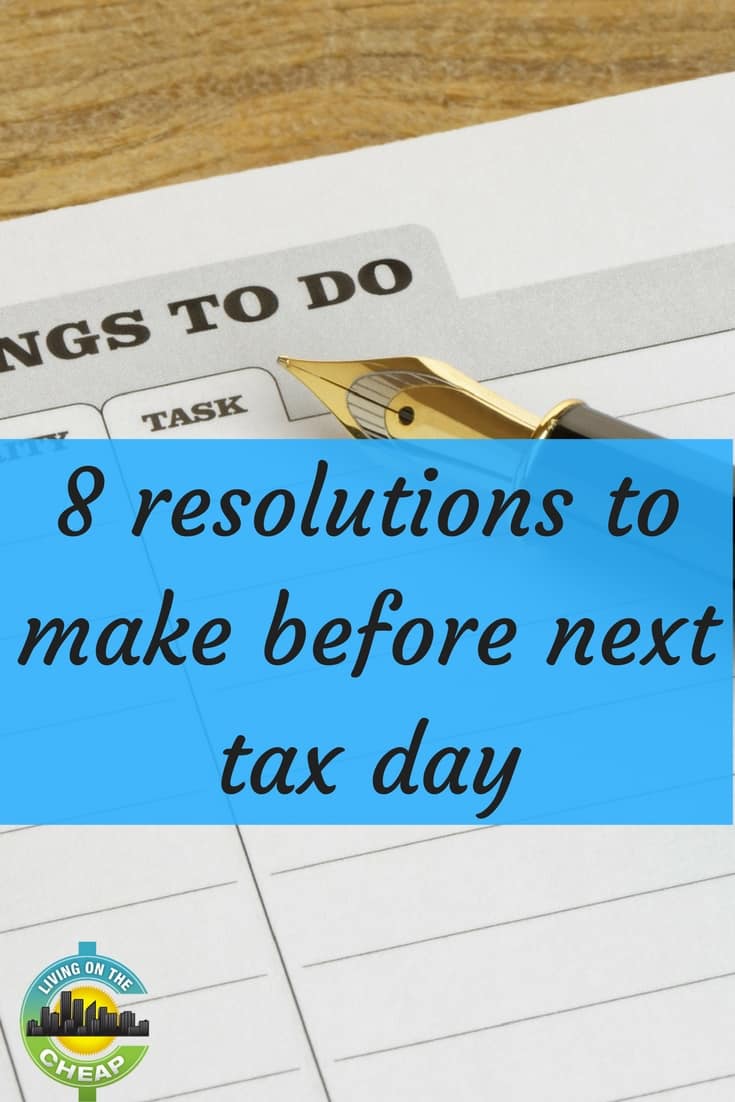Phew…. That’s the collective exhale you hear as another Tax Day comes and goes. Maybe you filed early and already have that refund in hand. Perhaps you waited until the last minute to dig out those dog-eared receipts, credit card statements and 1099s, and your return is still winging its way electronically to the Internal Revenue Service.
No matter your tactics, you’ve survived — but might want to do things differently next year. Here are eight Tax Day resolutions worth adopting now to put you in better shape for next year.

1. I will get organized.
Boulder, Colo., retiree Jon Bond rents out two single-family homes to supplement his income. That means keeping track of income and related expenses. “Every year I wait until March to dig through the paperwork and enter the information in a spreadsheet,” says Bond, who does his own taxes. “A few times, I even created the spreadsheet, but never filled it out.” Often he can’t find a credit card statement or check stub and then spends weeks tracking it down, on occasion missing the filing deadline.
Simple organizing methods work just fine, say experts. A multi-pocket expanding file labeled by category that holds all your receipts is one option. Or install Quicken or similar software. Enter every line item from your bank account and credit card statements on a monthly basis and generate a report at year’s end.
2. I will not overlook the big things.
One CPA tells of a longtime 30-something male client who casually quipped as they were saying their goodbyes, “Oh, I meant to tell you … we had a baby last fall.” With various tax credits for parents with dependent children, that oversight could have costed him thousands of dollars. Be sure to tell your tax preparer about any major life changes such as buying a house, a job change, a new baby or a divorce.
3. I will not procrastinate.
If your tax pro suggests you allow for more withholding or estimated payments, do it. You’re better off paying the extra quarterly taxes than hoarding your money in a bank account because you’ll earn less than 1% in interest, but the IRS will charge you a 3% penalty if you underpay.
4. I will not shortchange myself on charitable donations.
Raise your hand if you take boxes of items to Goodwill or Salvation Army, grab a blank receipt and then stash it somewhere. Instead, make a list and assign a value to all non-cash items you donate to charity. One woman donated so many women’s business suits they filled a minivan. Convinced the IRS might not believe her generosity, she photographed the stuffed van as proof.
5. I will keep a mileage log.
You can deduct a certain amount per mile driven for business purposes in 2022, provided you maintain a mileage log. Find the current amount on the IRS website. Sure, you can go back to your calendar at year’s end and figure out where you went each business day, but filling out a log as you go will save you time and sanity. Consider using a smartphone app such as MileIQ or TripLog.
6. I will follow the rules.
Accountants have seen it all. But many tell me they are shocked to have clients neglect to claim their required IRA distributions at age 72, leaving them subject to a 50% penalty. So if you don’t draw that $3,000, Uncle Sam now gets $1,500, ouch! Be sure to check with your broker, bank or credit union and have them remind you to take any required distributions.
Similarly, don’t pull money out of your retirement plan before age 59 1/2. There’s the tale of a woman who paid for a wedding with her credit card, but to pay off the debt, drew money out of her IRA. Not only was she subject to a 10% penalty, but the withdrawal was taxed as ordinary income. It would have been smarter to take a home equity loan, which is low interest and tax deductible.

7. I will seek professional advice when needed.
A self-employed e-commerce marketing consultant reported that she could have saved herself $1,500 to $2,000 the year she started her business had she formed her business as an S-Corp instead of a LLC. Trying to save a few bucks, she prepared her own tax returns and wasted a ton of time trying to figure everything out. When she finally met with an accountant, she learned she could have also saved a ton of money because she didn’t ask more questions about business structure.
The benefit of using a paid preparer is his or her objective eye. Under an LLC, every net dollar is subject to self-employment tax. If the consultant was an S-corp, she would still pay herself but only her salary is subject to self-employment tax.
8. I will give my tax preparer the gift of time.
It’s never too early to start a conversation with your tax preparer. In fact, most would appreciate a brief sit-down this May. Many clients often set appointments nearly a year in advance to force themselves to gather their documents early in preparation for a January or early-February sit-down. Be proactive. Ask questions throughout the year.
If you’re resolved to read more about taxes, you might also like:
- Free and low-cost ways to file your taxes online
- Save money on tax preparation by doing your own taxes

